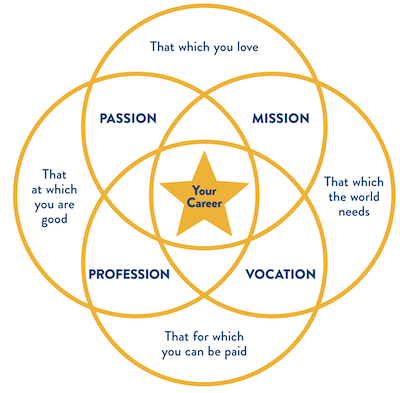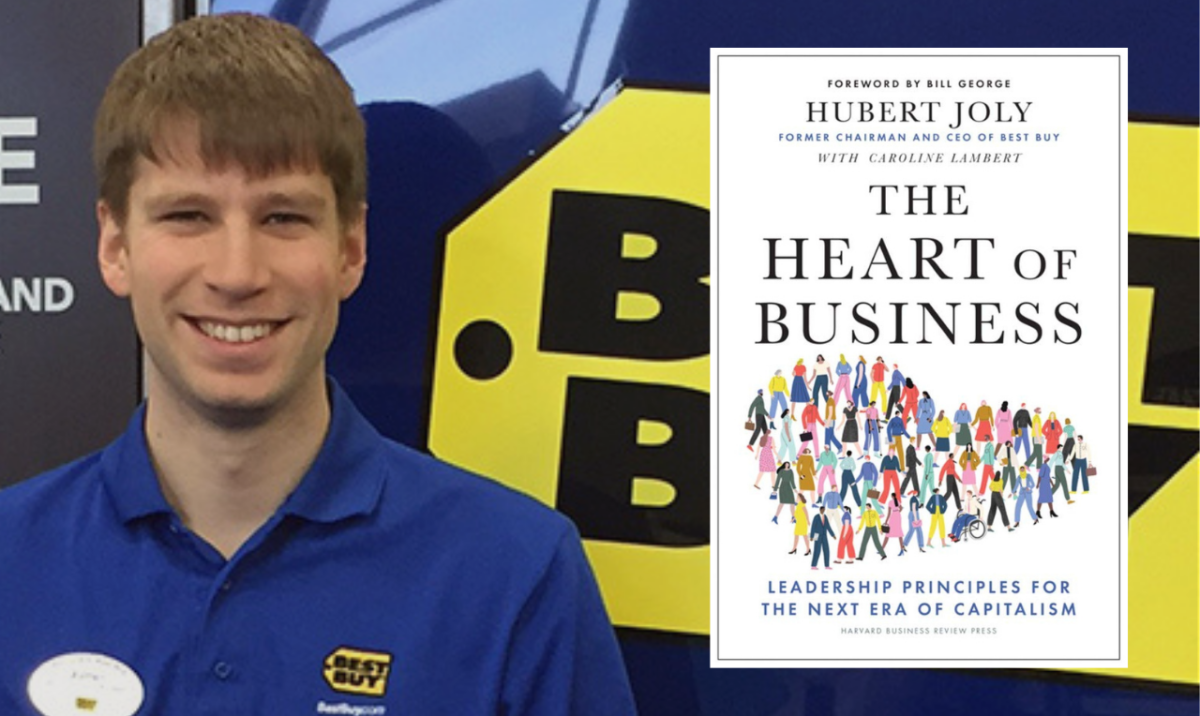I pulled off the highway, parked my car, and got out to take this photograph and then fired off this email to my colleagues at Best Buy, “Congratulations! We did it. We beat our long time competitor, Circuit City.”

But I was celebrating a bit too soon. The headwinds that destroyed Circuit City changed directions and onto Best Buy. It wasn’t looking good and I began to think I made an irreversible mistake.
A few years earlier I dropped out of college and accepted a position as an entry level salesperson at Best Buy. A hiring manager convinced me that Best Buy was a great company to work for and that I’d move up the ladder quickly.
The hiring manager was correct. Best Buy is a great company that treats its employees well. He was also correct that I would move up the ladder quickly. But whether it was from being overly confident or ignorant he failed to mention the massive challenges I’d face if I accepted his job offer and dedicated myself to the company.
Our customers knew the writing was on the wall long before I did.
Customers came into my store to use their gift cards, “While they still could”, declined buying extended warranties because they were worried we couldn’t honor them once our doors were shut, and they made comments whenever we ran out of stock of a product or our price wasn’t as good as Amazon such as, “Well this is why you’re going out of business.”
“This is why you’re going out of business.”
Being told this every single day doesn’t exactly boost your confidence. And one day I broke down after being told this for the 1,000th time. I finally admitted that the picture for the company’s future was grim and I logged into Fidelity and sold all my shares of the company stock.
But I did this too soon because unbeknownst to me there was a plot in place to save the company. Talks were happening between Carlson Companies CEO Hubert Joly and Jim Citrin of the North American CEO practice at Spencer Stuart an executive search company.
Hubert Joly shares in his book The Heart of Business what was going on in his head at this time, “But Jim’s idea did feel insane, no matter how I looked at it. I knew nothing about retail, and by 2012, Best Buy’s market dynamics were not looking good: online retailers, particularly Amazon, were fast disrupting electronics retail, leaving once powerful brands struggling. Circuit City had already filed for bankruptcy, and Radio Shack was heading in the same direction. In addition, several of Best Buy’s most important vendors— Apple, Microsoft, Sony, and others— were establishing their own stores. At the same time, Best Buy’s operational performance had been deteriorating in the domestic market for several years as the company looked to expand internationally. If all that weren’t enough, the CEO had just been fired; founder Dick Schulze wanted to take the company private; and analysts and investors were predicting that Best Buy was on its way to extinction.”
Find a career you’ll enjoy
According to Pew Research 95% of teens agree that having a job or career they enjoy will be extremely important or very important to them as adults. But Gallup reports 70% of your team isn’t engaged in their jobs.
When does this disconnect begin?
If we know as teens we want to have a job or career we enjoy, why don’t we have an engaging job or career we enjoy as adults?
How do we discover our purpose and thereby find a career we’ll enjoy?
Hubert Joly says, “There are multiple ways to travel that journey and discover your purpose. Here are a few I find particularly effective. In Discover Your True North, Bill George highlights the importance of crucibles in defining what one’s life purpose is going to be. In her book, Aligned, executive coach Hortense le Gentil shares a range of techniques she uses with her clients, from writing one’s own eulogy and revisiting childhood dreams to understanding what gives you energy.
Another useful technique is author Andres Zuzunaga’s approach of finding your purpose at the convergence of four elements: what you love, what you are good at, what the world needs, and what you can get paid for.”

Joly summarizes these techniques by stating “Find what gives you energy, what drives you, what you truly and profoundly aspire to, and what stands the test of time.”
Work for companies and leaders you believe in
Hubert Joly shares a story in his book from when he was a boy and his work experience was so poor that he made a commitment to someday lead a team and to create a great working culture. It’s important you find leaders and companies that believe in this same idea.
“To this day, I recall thinking while I was laid up that I would one day get to manage people. And I pledged to myself that, when the time came, I would remember what it felt like to work a job like this. The emptiness and the sense of disconnection. The indifference toward the company and whether it did well. The meaningless, mind-numbing tasks. Being so disengaged that I would take extra time to empty the trash or relish getting hit by a forklift because it meant getting away from work. I also promised myself that I would then do everything I could so that people who did work such frontline jobs would not feel the same way”
Listen to the excellent advice shared on the EntreLeadership podcast from David Salyers the former CMO of Chick-fil-A, “I found the job I wouldn’t want to retire from. Work can be something endearing, rewarding, and satisfying. The Chick-fil-A job offer was 50% less than the other offers I got when I was graduating college. But a mentor pulled me aside and said, “The last thing you need to worry about is how much money you’re going to make. Find a leader you believe in. One that you want to become more like. Find a company that you’d be proud to work for and at dinner conversations you’d be proud to talk about.”
In the book there’s a story about two masons during the Middle Ages, performing the exact same tasks. Each was asked about their work, but replied differently. “Don’t you see? I’m cutting stones,” said the first one, whereas the second took an entirely different view. “I’m building a cathedral,” he replied.
“We get to choose our purpose, regardless of what we do for a living. Like the first mason. zookeepers, for example, could consider their work as dull and boring, or even dirty— zookeepers, four out of five of whom have a college degree, spend a significant part of their day cleaning feces, scrubbing floors, and feeding animals. Instead, few ever quit, because most zookeepers choose to view their work as a personal calling to care of animals.”
Our flaws as leaders
“The quest for perfection can be evil! You cannot love others and develop a relationship with them if you do not first accept that you are imperfect and vulnerable, and need help.”
Father Samuel
This bold statement from Father Samuel was a big problem for Hubert Joly because at the time he thought he had all the answers and tended to look at his co-workers and employees as obstacles rather than valuable partners.
“I believed I could do it better than they could. Whenever a team would share some proposal or business plan with me, I would make sure to tell them how to improve it. Marshall Goldsmith [his executive coach], I later learned, calls this “adding too much value.” Without even realizing it, I was telling my teams what they should do. And for years, I kept trying to solve problems for them. In retrospect, this must have deeply demoralized them.”
This valuable advice from Marshall Goldsmith was difficult to receive because it contradicted what Joly was taught growing up. As a teenager he was once asked a question by one of his parent’s friends who was a businessman and he replied by saying, “I don’t know.”
The businessman said, “Young man, I hope you will never say that in the business world, because this is admitting a weakness, and you should never do this. This will limit your potential.”
At Best Buy admitting gaps in our knowledge became part of our training program and we trained our team members to say, “I don’t know.”
It went against the natural grain because people rarely like to admit they don’t know the answer to a question. I’ve found this is especially true for the sort of confident individuals that gravitate to sales positions.
Saying they didn’t know shocked our customers because at the time none of our competitors were admitting this, but we didn’t stop there. We trained our blue shirts to go one step further.
The team learned to say, “I don’t know the answer to that, but let me figure it out for you. Please wait.” Then the employee went to go find the answer by talking to a peer, searching on our intranet, or by asking a manager.
Reluctantly Joly accepted coaching from his executive coach Marshall Goldsmith. Through coaching he learned these five steps to combat his natural tendency to see others as obstacles and to fight his mentality of perfectionism:
- Thank people for their feedback
- Share what you’re working on
- Ask for advice
- Check in with them to hear how you’re doing
- Ask for more advice
“All this taught me that there can be no genuine human connection without vulnerability, and no vulnerability without imperfection.”
Crazy, goofy, or stupid
I remember shortly after Hubert Joly started at Best Buy he sent out an email to the entire company that said, “Reply to this email with the most crazy, goofy, or stupid parts of your job.”
I thought… Okay there is no way this is for real, this must be a trap.
But then I started to see changes throughout the company. We were given the ability to price match products shipped and sold by Amazon. Our employees and our customers were caught completely off guard by this. Customers said, “Why are you doing this?” And I’d reply, “Because I don’t want you to have to go home, sit down at your computer to order this product, and then wait for it to show up. Why don’t I sell it to you right now, for the same exact price, and then show you how to use it instead?”
Customers had been asking for us to price match Amazon for a long time and we would shrug our shoulders, look at the ground to avoid eye contact, and reluctantly said, “I’m sorry, but I can’t do that.”
But finally we could price match our biggest competitor and it was energizing, motivating, and exciting.
Another major change was our employee discount. Most of my team was working at Best Buy because of the discount. They were making around $10.00 per hour and were in high school or college. All the blue shirts have a real interest in technology. The paycheck isn’t that important to them it’s all about the exposure to the latest and greatest technology and the discount to purchase it.
And before it was removed our discount on products was fantastic. When business started to get really bad the discount was severely cut and products such as HDMI cords and computer cables that used to cost us $7.00 started costing double or triple that. It really hurt the team morale including mine as a leader.
But after talking to the blue shirts Hubert Joly made a dramatic shift. “One of the easiest decisions on benefits was to restore the employee discount. I had learned in St. Cloud how unpopular the decision to scrap it had been among employees. This had been hurting their morale— and therefore their willingness and ability to give their all to our turnaround.”
He wisely states, “When a business is in trouble, listening to the individuals on the front lines is the best place to quickly identify what “Crazy, goofy, or stupid” things, as I later told store managers, have been getting in the way.”
Asking for help
During our turnaround corporate made it loud and clear that we needed help and that we should not be ashamed to ask for it. This completely changed the culture on the sales floors and it transferred positively right to our customers. This was quite an adjustment though because we prided ourselves as being the experts and that we didn’t need any help. We’re home of the Geek Squad after all!
Here are some of the changes that were quickly made which proved we were no longer afraid of asking for help:
- Best Buy had an awful website and you couldn’t find what you were searching for. So we recruited Scott Durchslag from Expedia to run our e-commerce site.
- Sharon McCollam came out of retirement from Williams-Sonoma to join Best Buy as CFO.
- We partnered with our vendors and “competitors” Microsoft, Samsung, Sony, Amazon, Apple, and more to create stores within our stores with their latest and greatest products.
- The company asked for and was granted temporary discounts from major suppliers such as UPS, IBM, Accenture.
“This signaled within the company that no one should be afraid to be vulnerable. No one should be afraid to ask for help. No one should feel he or she had to pretend to be invincible or perfect, because we are all human, and it is in our vulnerability that we connect and unlock the power of the collective. This is how we connect with each other. This is how we connect with our customers, suppliers, communities, and shareholders. This is what a purposeful human organization is made of— in sickness and in health, in good times and in bad ones.”
But down on the front lines this sent a different signal. It sent a signal that there were things to be excited about. I began to regret selling my shares of the company’s stock. I was proud to wear my blue shirt when I was out around town after work and I was happy we were achieving these small victories that made it feel like the air was being put back into our sails.
These changes didn’t immediately show up on our PNL and the wall street analysts didn’t give us a lot of credit at first, but I know from the front lines that the culture shifted. The tone was different. We were no longer just going to be wrestled into bankruptcy. We decided to fight back and it was a ton of fun.
Just do it!
So how’s your work going? You may have struggled over the past 12 months or perhaps you’ve had the best 12 months in your company’s history.
Either way it’s important for you to learn from the dozens of lessons that Hubert Joly shares in his book The Heart of Business. The few I shared don’t even begin to scratch the surface of all the wisdom you’ll gain from Hubert Joly’s long career holding top level leadership positions.
When Hubert Joly worked at EDS France the CEO of Nike gave him a batch of Just Do It! stickers. He’d give these stickers to his team whenever they had an idea, “I wanted everyone to feel that they could run with their ideas and try them out. I also wanted them to know that they were allowed to make mistakes. If new ideas did not work out, they would learn and correct course.”
I challenge you pick one thing to do differently this week. Be vulnerable. Be willing to make a mistake. Take a chance. Think about it and then please share what you’re going to do in the comments below. I’ll read and reply to them all. Just do it!
